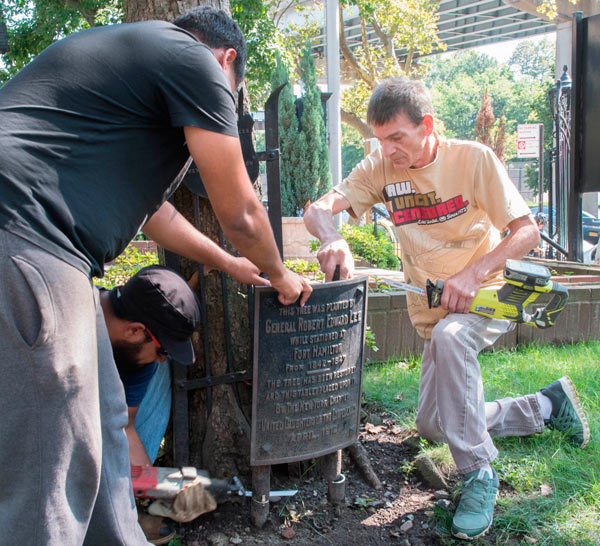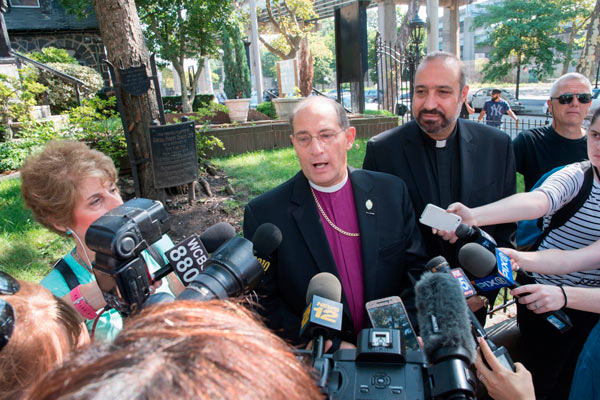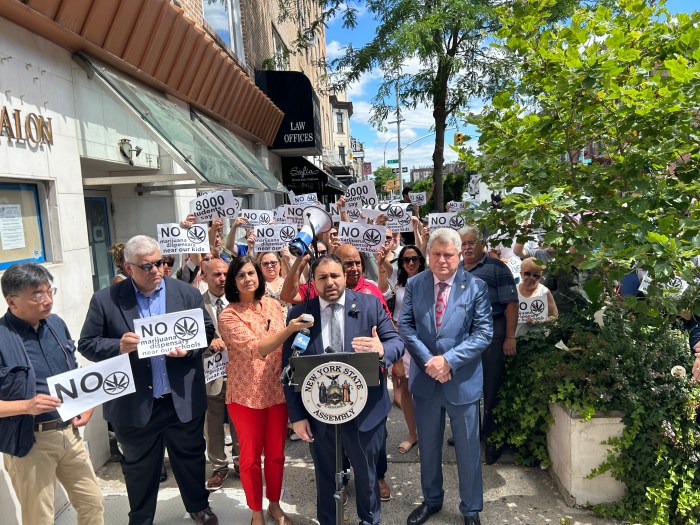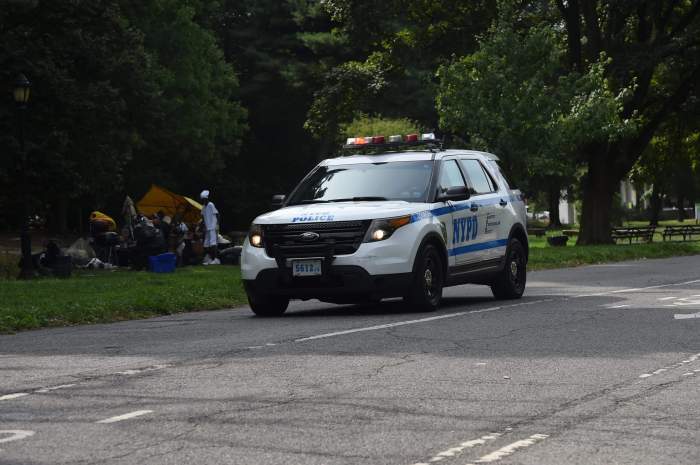A plaque commemorating the Confederate leader General Robert E. Lee was hauled off the grounds of the so-called Church of the Generals in Bay Ridge on Aug. 16 in the wake of last weekend’s white supremacist protests and violence in Charlottesville, sending a message that racism has no place in Brooklyn, according to a local political hopeful.
“Removing this plaque makes it very clear that while we will never forget the history of slavery in America, we are ready to move forward and address racism at its root,” said Rev. Khader El-Yateem, a Democrat running for the Bay Ridge city Council seat.
Neighborhood advocates and religious leaders sought the removal of the more-than-100-year-old plaque following the murder of activist Heather Heyer on Aug. 12 by a neo-Nazi who allegedly rammed his car into a crowd of non-violent demonstrators during a protest about the removal of a stature of Lee from a Virginia public park. The sign marked a tree the Confederate leader planted outside the now-shuttered St. John’s Episcopal Church, known as the Church of Generals because of all of the army members stationed at nearby Fort Hamilton who worshipped there.
“This was an easy decision. No one should walk by a church and see a monument honoring someone who fought to preserve slavery. It doesn’t mean that we forget the history, but it means that we need to remember it differently,” said Bishop Lawrence Provenzano of the Episcopal Diocese of Long Island. “In the sense that the church can stand for all of God’s people and stand for the Gospel of Jesus Christ, we removed these plaques as one of the many outward invisible expressions of our solidarity with God’s people, particularly those who are feeling oppressed by the actions of white supremacists and the neo-Nazi movement and its support across this nation.”
Lee was stationed at the Bay Ridge Army base in the 1840s — years before the Civil War — when he planted the maple tree at the Fort Hamilton Parkway church. The iron sign honoring the Confederate general was posted there in 1912.
But following the wave of calls nationwide to remove similar monuments that celebrate the country’s history of slavery, El-Yateem and others jumped on board to demand the removal of Lee’s plaque outside the church. The Episcopal Diocese of Long Island’s decision to remove something that memorializes a defender of slavery is a step in the right direction, said the would-be councilman.
“I am grateful that our advocacy worked,” he said. “The Episcopal Diocese of Long Island is on the right side of history by removing this symbol that venerates our history of slavery.”
But there’s still more to be done, according to a handful of pols, including Rep. Yvette Clarke (D–Flatbush) and Borough President Adams, who are calling on the U.S. Army to change street names inside the Fort Hamilton Army Base that honor Confederate leaders, such as General Lee Avenue and Stonewall Jackson Drive. The push to change the names gained steam in 2015 after a racially motivated mass shooting in a church in Charleston, S.C., sparked a nationwide movement to remove Confederate flags and other memorials from public spaces.
Back in June, members of Brooklyn’s congressional delegation, including Rep. Yvette Clarke, Rep. Jerrold Nadler, Rep. Nydia Velázquez, and Rep. Hakeem Jeffries, petitioned the Department of the Army to change the names, but the Pentagon rebuffed the request.
In a July 20 letter to the delegation, Army spokeswoman Diane Randon wrote that “After over a century any effort to rename memorializations on Fort Hamilton would be controversial and divisive.”
Now, less than a week after one of the most controversial and divisive incidents in the movement to remove Confederate memorializations, pressure is building anew on the Army over the street names.
“Symbols of slavery and racism have no place in New York,” he wrote.
On the same day, even Republican mayoral candidate Assembylwoman Nicole Malliotakis (R–Bay Ridge) added her voice, to make a bipartisan call to change the street names.























